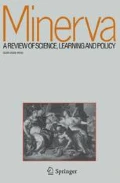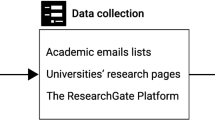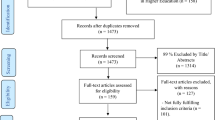Abstract
This study analyzes whether academics with advanced degrees from foreign universities are more research productive than their domestic counterparts in the three selected East Asian higher education systems – Korea, Hong Kong, and Malaysia. The three systems have relatively large proportions of foreign degree holders among their professoriates. The data for this study is drawn from the Changing Academic Profession survey. In our negative binominal regression analysis, we found that foreign degree holders are not more research productive than their colleagues with domestic degrees, and even slightly less productive than domestic degree holders in soft disciplines (arts, humanities, and social sciences) in Korea unless they have further foreign post-doc experience after their PhD. Furthermore, foreign degree holders are less productive in hard disciplines (natural sciences, engineering, and bio-medical sciences) in Malaysia. Finally, we discuss the findings and attribute them to contextual differences between the three localities.
Similar content being viewed by others
Notes
As used here, East Asia includes both southeast and northeast Asia.
References
Altbach, Philip G. 1981. The university as center and periphery. Teachers College Record 82(4): 600–621.
Arnove, Robert F. 1980. Comparative education and world-systems analysis. Comparative Education Review 24(1): 48–62.
Azman, Norzaini, Vincent Pang, Morshidi Sirat, and Aida Md Yunus. 2014. Teaching and research in Malaysian public universities: Synergistic or antagonistic? In Teaching and research in contemporary higher education: Systems, activities and rewards, eds. J.C. Shin, A. Arimoto, W.K. Cummings, and U. Teichler. Netherlands: Springer.
Bennion, Alice, and William Locke. 2010. The early career paths and employment conditions of the academic profession in seventeen countries. European Review (Supplement on the Academic Profession). Journal of the Academia Europaea 18(1): S7–S33.
Bess, James L. 1978. Anticipatory socialization of graduate students. Research in Higher Education 8(4): 289–317.
Blacki, J. Stewart. 1992. Coming home: the relationship of expatriate expectations with repatriation adjustment and job performance. Human Relations 45(2): 178–192.
Bland, Carole J., and Mack T. Ruffin. 1992. Characteristics of a productive research environment: Literature Review. Academic Medicine 67(6): 385–397.
Bratsberg, Bernt. 1995. The incidence of non-return among foreign students in the United States. Economics of Education Review 14(4): 373–384.
Braxton, John M., William Luckey, and Patricia Helland. 2002. Institutionalizing a broader view of scholarship through Boyer’s four dimensions. ASHE-ERIC Higher Education Report 29(2): JOSSEY-BASS.
Brown, Phillip. 2000. The globalization of positional competition? Sociology 34(4): 633–653.
Buchmueller, Thomas C., Jeff Dominitz, and W. Lee Hansen. 1999. Graduate training and the early career productivity of Ph.D. economists. Economics of Education Review 18(1): 65–77.
Cantwell, Brendan, Sandra G. Luca, and Jenny J. Lee. 2009. Exploring the orientations of international students in Mexico: Differences by geographic region of origin. Higher Education 57(3): 335–354.
Carrington, William J., and Enrica D. Detragiache. 1998. How big is the brain drain? IMF Working Paper 98/102: 1–27.
Corley, Elizabeth A., and Meghna Sabharwal. 2007. Foreign-born academic scientists and engineers: producing more and getting less than their US-born peers? Research in Higher Education 48(8): 909–940.
Cresswell, J. W. 1985. Faculty research performances: Lessons from the science and social sciences (ASHE-ERIC Higher education Report No.4). Washington, DC: Association for the Study of Higher Education.
Cummings, William K. 1994. From knowledge seeking to knowledge creation: the Japanese university’s challenge. Higher Education 27(4): 399–415.
Dundar, Halil, and Darrell R. Lewis. 1998. Determinants of research productivity in higher education. Research in Higher Education 39(6): 607–631.
Enders, Jürgen. 2005. Border crossings: Research training, knowledge dissemination and the transformation of academic work. Higher Education 49(1/2): 119–133.
Finn, Michael G. 2007. Using NSF data on scientists and engineers to estimate stay rates of foreign doctorate recipients. Paper presented at the Workshop for Using Human Resource Data from Science Resources Statistics. National Science Foundation, VA. Ridge Institute for Science and Education.
Glanzel, Wolfgang. 2001. National characteristics in international scientific co-authorships. Scientometrics 48(2): 121–150.
Hassan, Aminuddin, Peter Tymss, and Ismail Habsah. 2008. Academic productivity as perceived by Malaysian academics. Journal of Higher Education Policy and Management 30(3): 283–296.
Hirsch, Fred. 1976. Social limits to growth. Cambridge, MA: Harvard University Press.
Ho, Kong Chong. 2013. Peering through the dust of construction: Singapore’s efforts to build WCUs. In Institutionalization of world-class university in global competition, eds. J.C. Shin, and Barbara M. Kehm, 225–236. Berlin: Springer.
Horta, Hugo. 2009. Holding a post-doctoral position before becoming a faculty member: does it bring benefits for the scholarly enterprise? Higher Education 58(5): 689–721.
Horta, Hugo, Sato Machi, and Akiyoshi Yonezawa. 2011. Academic inbreeding: exploring its characteristics and rationale in Japanese universities using a qualitative perspective. Asia Pacific Education Review 12(1): 35–44.
Horta, Hugo, Vincent Dautel, and Francisco M. Veloso. 2012. An output perspective on the teaching-research Nexus: An analysis on the US higher education system. Studies in Higher Education 37(2): 171–187.
Hunter, Deborah E., and George D. Kuh. 1987. The “Writing Wing”: Characteristics of prolific contributors to the higher education literature. The Journal of Higher Education 58(4): 443–462.
Hu, Qing, and T. Grandon Gill. 2000. Is faculty research productivity: Influential factors and implications. Information Resources Management Journal (IRMJ) 13(2): 15–25.
Ilon, Lynn. 2013. Integrating international faculty into Korea’s top national university. Unpublished research report, Seoul National University.
Jonkers, Koen, and Robert Tijssen. 2008. Chinese researchers returning home: Impacts of international mobility on research collaboration and scientific productivity. Scientometrics 77(2): 309–333.
Kim, Jongyoung. 2011. Aspiration for global cultural capital in the stratified realm of global higher education: why do Korean students go to US graduate schools? British Journal of Sociology of Education 32(1): 109–126.
Knight, Jane, and Morshidi Sirat. 2011. The complexities and challenges of regional education hubs: Focus on Malaysia. Higher Education 62(5): 593–606.
Le, Thanh. 2008. ‘Brain drain’ or ‘brain circulation’: Evidence from OECD’s international migration and R and D spillovers. Scottish Journal of Political Economy 55(5): 618–636.
Lee, Jenny J., and Dongbin Kim. 2010. Brain gain or brain circulation? U.S. doctoral recipients returning to South Korea. Higher Education 59(5): 627–643.
Levidow, Les. 2002. Marketizing higher education: neoliberal strategies and counter-strategies. In The virtual university? Knowledge, markets and management, eds. Kevin Robins, and Frank Webster, 227–248. Oxford, UK: Oxford University Press.
Mahroum, Sami. 2005. The international policies of brain gain: A review. Technology Analysis and Strategic Management 17(2): 219–230.
Malaysia government. 2010. The Ninth Malaysia Plan, 2011-2015. Kuala Lumpur: Percetakan Nasional Malaysia Berhad.
Mamiseishvili, Ketevan, and Vicky J. Rosser. 2010. International and citizen faculty in the United States: An examination of their productivity at research universities. Research in Higher Education 51(1): 88–107.
Melin, Göran. 2004. Postdoc abroad: Inherited scientific contacts or establishment of new networks. Research Evaluation 13(2): 95–102.
Nguyen, Tuan V., and Ly T. Pham. 2011. Scientific output and its relationship to knowledge economy: an analysis of ASEAN countries. Scientometrics 89(1): 107–117.
Piro, Fredrik Niclas, Dag W. Aksnes, and Kristoffer Rørstad. 2013. A macro analysis of productivity differences across fields: Challenges in the measurement of scientific publishing. Journal of the American Society for Information Science and Technology 64(2): 307–320.
Postiglione, Gerard A. 2013. Anchoring globalization in Hong Kong’s research universities: Network, agents, institutional arrangements and brain circulation. Studies in Higher Education 38(3): 345–366.
Postiglione, Gerard A., and Shiru Wang. 2011. Governance of the Academy in Hong Kong. In Changing Governance and Management in Higher Education, eds. William Locke, W. Cummings, and D. Fisher, 343–368. Berlin: Springer Press.
Postiglione, Gerard A., and Jisun Jung. 2013. Frameworks for creating research universities: The Hong Kong case. In Institutionalization of world-class university in global competition, eds. J.C. Shin, and B.M. Kehm, 237–256. Berlin: Springer.
Raudenbush, Stephen W., and Anthony S. Bryk. 2002. Hierarchical Linear Model: Applications and Data Analysis Methods, 2nd edn. Beverly Hills, CA: Sage Publications.
Sambunjak, Dario, and Matko Marusic. 2011. Between forwarding and mentoring: a qualitative study of recommending medical doctors for international postdoctoral research positions. BMC Medical Education 11(31): 1–9.
Saxenian, Anna Lee. 2002. Brain circulation: How high-skill immigration makes everyone better off. The Brookings Review 20(1): 28–31.
Smeby, J.C., and Sverre Try. 2005. Departmental contexts and faculty research activity in Norway. Research in Higher Education 46(6): 593–619.
Shin, Jung Cheol, and William K. Cummings. 2010. Multi-level analysis of academic publishing across discipline: research performance, collaboration, and time on research. Scientometrics 85(2): 582–594.
Shin, Jung Cheol, and Yong Suk Jang. 2013. World class university in Korea: Proactive government, responsive university, and procrastinating academics. In Institutionalization of world-class university in global competition, eds. J.C. Shin, and B.M. Kehm, 147–164. Berlin: Springer.
Shin, Jung Cheol, and Barbara M. Kehm. 2013. Institutionalization of world-class university in global competition. Berlin: Springer.
Sirat, Morshidi. 2013. Malaysia’s world-class university ambition: An assessment. In Institutionalization of world-class university in global competition, eds. J.C. Shin, and B.M. Kehm, 205–224. Berlin: Springer.
The World Bank. 2007. Malaysia and the Knowledge Economy: Building a World-class Higher Education System. Washington: The World Bank. http://web.worldbank.org. Accessed 5 November 2010.
Torres, Carlos A., and Daniel Schugurensky. 2002. The political economy of higher education in the era of neoliberal globalization: Latin America in comparative perspective. Higher Education 43(4): 429–455.
Toutkoushian, Robert K., and Karen Webber. 2011. Measuring the research performance of postsecondary institutions. In University ranking: Theoretical basis, methodology and impacts on global higher education, eds. J.C. Shin, R.K. Toutkoushian, and U. Teichler. Dordrecht: Springer.
UNESCO. 2012. Statistics for education: Outbound mobile students. UNESCO Institute for Statistics. http://stats.uis.unesco.org/unesco/TableViewer/tableView.aspx?ReportId=3968. Accessed April 29 2013.
Vandermoere, Frédéric, and Raf Vanderstraeten. 2012. Disciplinary networks and bounding: Scientific communication between science and technology studies and the history of science. Minerva 50(4): 451–470.
Vasileiadou, Eleftheria, and Rens Vliegenthart. 2009. Research Productivity in the era of the internet revisited. Research Policy 38(8): 1260–1268.
Waters, Johanna L. 2009. In pursuit of scarcity: transnational students, `employability’, and the MBA. Environment and Planning 41(8): 1865–1883.
Webber, Karen. 2012. Research productivity of foreign-and US born faculty: differences by time on task. Higher Education 64(5): 709–729.
Acknowledgments
We thank two reviewers for their thoughtful comments. This work was supported under the framework of an international cooperation program managed by National Research Foundation of Korea (NRF-2013054345) and the General Research Fund of the Research Grants Council HKU 7456/05H and HKU 7021-PPR-12.
Author information
Authors and Affiliations
Corresponding author
Rights and permissions
About this article
Cite this article
Shin, J.C., Jung, J., Postiglione, G.A. et al. Research Productivity of Returnees from Study Abroad in Korea, Hong Kong, and Malaysia. Minerva 52, 467–487 (2014). https://doi.org/10.1007/s11024-014-9259-9
Published:
Issue Date:
DOI: https://doi.org/10.1007/s11024-014-9259-9




